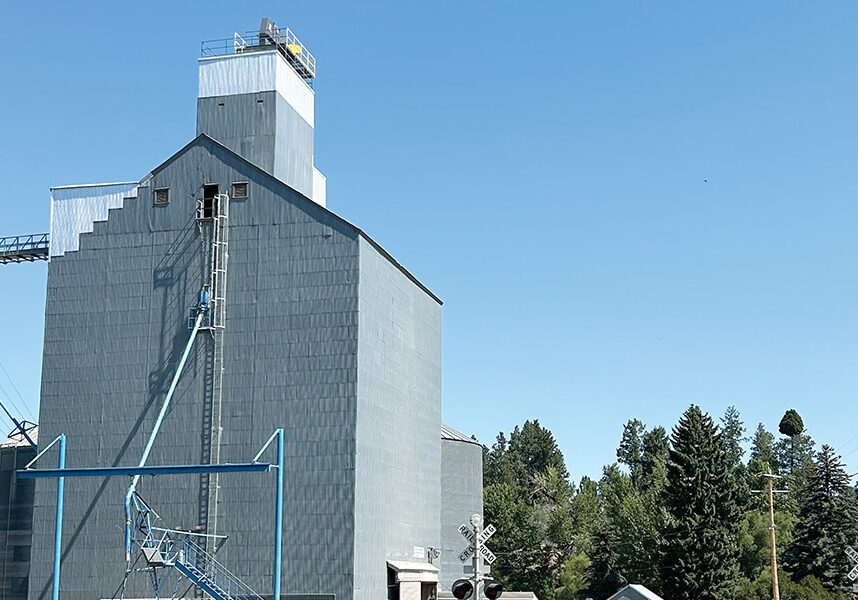Insurance woes Courage costs on wooden crib elevators rise dramatically
2023August 2023
By Trista Crossley
Editor

Elevators across Eastern Washington are suddenly finding it hard to insure parts of their structures regardless of condition, and if they do find insurance, the price is sky high.
Palouse Grain Growers Manager Mike Bagott said they were unable to renew the insurance on their wooden crib elevator through their traditional insurance company, despite recently finishing nearly $750,000 worth of improvements on it. They finally found an alternate insurance company that would ensure the structure, but it added nearly 50% to the cost of their insurance policy.
“For us, that crib elevator is a real critical point. Not only is it where the pit is and handles the influx, but it also acts as a distribution point,” he said. “We figured that for the time being, it’s worth biting the bullet, so to speak, and paying the additional charge, but also sensing the need to start setting money aside to self-insure at some point.”
Palouse Grain Growers also has some older steel bins they weren’t able to fully insure. Bagott said the replacement cost is three to four times more than the insurance covers.
“It’s not quite as bad (as the crib elevators), but it’s the same story. If something ever happens to them, to get yourselves back on your feet could be a killer. We are the little guy left out here, and it could be the end of the highway for us,” he said. “Some of these huge harvests we’ve had lately are putting the whole system to the test as far as being able to handle everything. It’s going to be a challenge going forward, especially if this kind of stuff is going to happen.”
Garrett Egland, manager at the Uniontown Co-Op, is in the same position. They’ve got four wooden crib elevators that are critical to their operation. The bins, which hold between 3,000 and 6,000 bushels each, allows the co-op to handle a number of different varieties of pulses that need to be segregated from each other.
“The bins give us a lot of puzzle pieces that we can put together to fit a lot in,” Egland said. “We end up with a lot of segregation and having a variety of smaller bins in crib houses makes (that segregation) possible.”
Uniontown Co-Op’s crib elevators are at least 50 years old — the oldest was built in 1916 — but they have been very well maintained. Like Palouse Grain Growers, Uniontown Co-Op ended up finding insurance through an outside company at an added cost.
“All of our insurance went up. It’s awful,” Egland said. “The cost of insuring facilities has gone up ridiculously across the board. It’s getting to be, if you want to build any more storage, it’s more expensive than it’s ever been.”
Alliant Insurance Services’ Lee Tilleman, a national broker for commercial ag insurance, said there are approximately two dozen wooden crib elevators in use in the Inland Northwest grain region that had issues getting insurance coverage this year. Tilleman, the insurance agent for both Palouse Grain Growers and the Uniontown Co-Op, said the problem is nationwide and stems from insurance carriers having to pay out more in claims than they are collecting in premiums.
“The carriers’ reaction to this is to increase premiums and restrict coverage,” he explained. “The crib elevators are high risk facilities in terms of fire, because, obviously, they are built of wood. Once they catch fire, they are usually a total loss. Insurance carriers are trying to reduce their exposure to high risk facilities, and crib elevators are considered high risk. The crib elevators are all being excluded by domestic insurance carriers.”
When insurance is found, it is costing anywhere from five to 10 times what elevators were paying before. In fact, Tilleman said underwriters are reducing coverage not only on crib elevators, but older facilities in general. Anything older than 1990 can only be insured for a stated value rather than the replacement cost.
“One thing that’s difficult in this situation, is these crib elevators are still a viable storage facility, and the segregation they provide for product is huge for these grain companies,” he said. “Unfortunately, they are a hundred years old. It’s a very difficult situation, Nobody did anything wrong. It’s just Mother Nature, inflation, the age of facilities that’s caused this. There’s no easy answer.”












